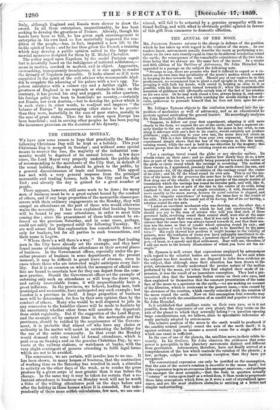EMILE DE GIRARDIN AND THE EUROPEAN POLICY OF FRANCE.
TIIE Emperor Napoleon is a beggar for a policy, and in pure charity M. Emile de Girardin kindly presents him with one, gratis ! The prisoner of Ham being a person who has not re- flected,—who has no acquaintance with France or the rest of Europe,—who has not studied the life of nations,—who has been unable to invent any plan of action and in fact has not succeeded in life, keeps the country over which he is placed without any policy worth speaking of; and M. de Girardin advances as a volunteer to teach the Emperor Napoleon his business ! We do not remember ever to have witnessed an act of charity exercised with more spontaneous magnificence of liberality. The exhibition of M. de Girardin is truly interesting, and Englishmen only regret that the slightest curtailment should have been applied to so truly remarkable a pamphlet.
The writer's first object is to establish that France is alone in being without a foreign policy. The policy of England is to find markets for her produce ; of Austria, to draw closer and augment her bundle of states ; of Prussia, to counter- balance Austria ; of Russia, to execute the will of Peter the Great ; but of France—nil. Should this report have even a shadow of accuracy, it might be said that, except England, France is the only country which is succeeding in her foreign policy. Russia has been compelled to retract from the execution of the celebrated " in order to fall back upon friendly alliances and domestic reforms. As to Prussia, the Prince Rent endea- voured to lend his weight in favour of Austria, until the Imperial Government which has sold itself to Count Bernard de Rechberg, rendered the kind intentions of Prussia simply impracticable ; so that the foreign policy assigned to Prussia by the clever French politician has succeeded through misadventure. If Austria's policy is to draw closer, and to augment her bundle of states, her success consists in losing Lombardy, jeopardizing Venetia and Hungary, and in being compelled to explain under what circum- stances she is unable to make those concessions which would prevent her states from rebellious manifestations. If England's policy is "to find markets for her produce," it is remarkable that she has persevered in a legislation which has for its sole direct object to admit the produce of other countries to her own markets. M. de Girardin must be "the Sleeper Awakened," a French Rip van Winkle.
It is not that he is blind to praiseworthy intentions on the part
of the Emperor whom he kindly takes under his wing. "The Emperor Napoleon the Third he says, "has laudable projects and inspirations,—it would be unjust to deny the fact;" but "his policy is a labyrinth from which it is difficult to issue with- out a conducting thread.' He has hitherto thwarted Russia and truckled to England ; the words are our own, but they are the
brief expression of M. de Girardin's ampler exposition. " To
have a policy," says the oracular ex-journalist, ' to have an object in view ; not to have an object is not to have a policy." " Napoleon the First conquered merely to conquer," and Napoleon the Third is missing the grand object to which his Mentor now directs his attention. It is to construct a great maritime equi- librium which is not less important than the territorial ; and if we construe the distinguished essayist right, it is more especially to begin by balancing against each other the selfish interests of Russia and of England. Does Russia wish to possess herself of the the Straits of the Dardanelles, France acts as the ally of England against Russia, but on the condition that England shall neu- tralize the Straits of Gibraltar, remove the menace of Aden from Babelmandeb, give up Perini, the key to the Red Sea' disarm Corfu, the key of the Adriatic, and dismantle Malta. If England persists in maintaining its maritime fortresses then France is an ally of Russia ; but on condition that all the straits, to begin with the Dardanelles, shall be neutralized. Thus France becomes the arbiter of neutrality and the balancer of power in Europe ; a policy, says M. de Girardin, " certain to be followed by the United. States!" Should England recaleitrate, Spain might be aroused to keep Tangiers, and England might be called upon, in the name of civilization, to render an account of her victims in India, and of the "three millions of Irish dead of famine ; " the eminent French essayist being great in his arithmetic, and wholly disre- garding the small trifle that when famine seized upon the Irish, through the act of God and their own feebleness, England sent help and money. Such, if we at all succeed in grasping anything so vast, is the policy of which M. de Girardin makes a present to the Emperor Napoleon. Possibly in France they may be able to read M. de Girardin's history of England and her policy by the light of his strange reve- lations with regard to France and her policy ; for one account we believe to be about as accurate as the other. In this country the pamphlet ought to have a solid practical utility, since it tells us the kind of politicians with which the Emperor Napoleon has to deal;' and we may remember that instead of being simply the great embodied absurdity which he would be considered in this country, M. de Girardin has been a leading journalist, has been lately spoken of as the Aohates of an Imperial Aneas, and writes with a degree of artistic power seldom in this country divorced from sense and sound information. He belongs to a type of men who, monstrous as the fact may seem, do possess influence in ?ranee, and have to be taken into account when the rulers of that country are planning any course of action. It is a splendid example of the fact, that in the eyes of manymelodramatic Frenchmen, the Emperor Napoleon is at present sinning against his country because he is not conspiring against England. The assertion that the Emperor Napoleon has no foreign policy is undoubtedly as wild as any in the brochure. Before we glance at the actual position of the Emperor, we must remember his antece- dents. We must remember that his dynasty has once before been seated on the throne of France, and that it proved then to be more congenial to the national genius,—let us be pardoned the phrase, —than the ancien regime, which had, in extreme old age, reached its detested grave ; than the theatrical Republic, a burlesque upon the traditions of classic Rome; • or than the somewhat borough English" regime which the Citizen King attempted to introduce as his specialite. But the first Napoleon was misled by the means of his own success, and forgot to identify—perhaps had not time to identify—his dynasty with the civil interests of France, or with the fellowship of the countries around him. When favouring cir- cumstance placed the Third Napoleon upon the French throne, not only did it become his business to supply these serious omissions in the policy of the first Napoleon, but his actions have proclaimed that he did not overlook the opportunity. The dynasty, of Napo- leon has, as we have said, proved most congenial to the genius of the French people ; and the "object" which is the backbone of the Emperor Napoleon's policy is to identify that dynasty, not only with the fullest development of French feeling, French vigour, and French strength, but also with the civil in- terests of the entire population, and with the fellowship of surrounding, states. In this country we are prone to ob- ject that Napoleon the Third has hitherto imposed restraints upon that which has been, and which in future must be, the crowning glory of France—her intellectual development, by
placing official restraints upon the pen and press. But it is ab- surd not to remember that Napoleon still has to make the whole
body of the nation feel that the continuance of his dynasty is identified with the civil interests of the entire community; and he has also, without interruption, to show foreign states that he
can command their fellowship by the sincerity and value of his
international cooperation. In the first instance the English al- liance was forced upon him by the suspicions Of other Imperial
Governments while it was rendered valuable by the frank ac- ceptance of !Lord Palmerston, followed up by the genuine friend- ship which Queen Victoria extended to her brother monarch. On each signal occasion the foreign policy of the Emperor Napoleon has chosen the side of generosity. In the case of the Holy Sepul- chre, the least important occasion, he was at least animated by a chivalrous purpose ; in the cause of Turkey he was on the side of the oppressed ; when England was assailed in India, he offered aid by a short cut; when we were assailed in China, a large con-
tingent was ready from France ; when Russia abandoned her ag- gressive designs, and appeared as the patron of Italy, Napoleon was by her side : he fought on the side of the national party in
Italy, although England and Russia were slower to draw the sword. In all these enterprises, unquestionably, he has been seeking to develop the greatness of France. Already, though his hands have been so full, he has given such encouragement to enterprise in his own land as has materially improved the con- dition of the people,—has, in fact, imparted a new life to the feeble spirit of trade ; and he has thus given the French a training which may develop a public opinion suited to the large com- mercial measures designed for them by M. Michel Chevalier.
The policy urged upon Napoleon by the model Parisian esprit fort is avowedly based on the indulgence of national selfishness,— mean in motive, crooked in method, evil in object. Aggressive, encroaching, transparently treacherous, it is one again to render the dynasty of Napoleon impossible. It looks almost as if it were suggested in the spirit of the evil adviser who recommends Alad- din to complete the adorning of his palace with a roc's egg. Na- poleon calculates with a calmer eye and a farther sight. The greatness of England is no reproach or obstacle to him ; on the contrary, it has proved his stay and support. In other quarters, his foreign policy has been to humiliate no country,—certainly not Russia, nor even Austria,—but to develop the power which is in each state ; in other words, to readjust and improve " the balance of Europe" by encouraging other states to be greater than they were, materially in the case of poor states, morally in the case of great states. Thus far his action upon Europe has been beneficial ; and in serving other peoples he has been paying the insurance premium on the duration of his dynasty.



























 Previous page
Previous page